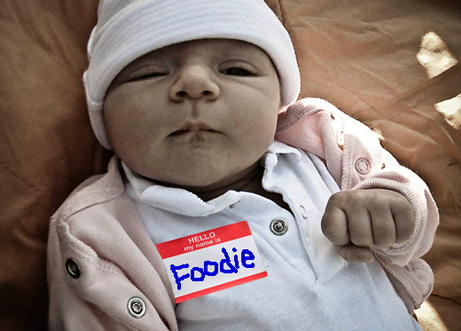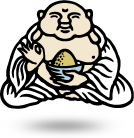Origins of a Foodie
Posted by Ben Garfinkel on Friday, June 27th, 2008Tags for this Article: baby, book, literature, teaching

Recently I became a father to a wonderful little girl, Lila. In the weeks and months leading up to her arrival Andrea and I spent a huge amount of time painting the house, getting rid of stuff (to make room for the 8lb baby and 80lbs of stuff they come with!).
Part of the process involved a book culling. I took the opportunity to house all my food and cooking related tomes in one place which was nice. I got rid of a few duds and discovered some ephemeral treasures such as The Official Foodie Handbook by Ann Barr and Paul Levy. The book is from 1984 and the cover is 100 percent cheeseball (I think quite literally as there’s a photo of the Parthenon or something made entirely of food). Anyway, as it turns out, the contents of the book are quite interesting. I’m still only part way through this book which is packed tightly with all manner of interesting stuff.
I thought I’d find out a bit more info and also discovered that Levy is actually credited with coining the term “Foodie”. Now that is impressive.
With Lila due within weeks, I stumbled onto a chapter titled “The Foodie Life Cycle” on page 19. I’m completely hopeful Lila doesn’t fulfill the exact path outlined, but if she has any of my genes (really hope so!), there’s a good chance she’ll alienate some classmates in the school cafeteria, eschewing sloppy joes for smoked black cod. I’m shamelessly reproducing the full text here with credit in part because I could not have delivered it better. Despite some things which are now outdated and no longer true, much is eerily accurate and now seems rather prophetic given it was penned almost 25 years ago. So dear Lila:
A second generation Foodie is as rare as a white truffle
You are about to be born, to Foodie parents. You will be that rarity in the Foodie word, someone who was born not converted. There will be more of you in the future, but at present you are an infant pioneer–a person with roughly 70 years of service to food in front of you: 51,100 major meals. They will pass all too fast.
You have made arrangements to take your first [meal] in San Francisco rather than Los Angeles, New York rather than Boston, Chicago rather than St. Louis, London rather than Manchester and Lyon rather than Paris; if you are in the eastern hemisphere you have chosen Hong Kong in preference to Manila and Tokyo to Sydney. Above all you have avoided eastern Europe.
You will spend the next four to six months at your mother’s breast, laying down a sensible nutritional foundation for, in preparation for the solid business of a lifetime. If you’ve been born in America, your parents will have no problem weaning you onto a Foodie diet; but if you’ve had the bad luck to be born somewhere where Beechnut Baby Foods (sugar-free, salt-free, additive-free) are not sold, your parents will make a thorough search of the shops of North London or around the rue de Rosier in Paris, Beechnut Foods are also kosher.
After teething comes the serious task of learning to eat properly. Your parents will be vigilant about your sugar and animal fat intake, because they know that, as an adult Foodie, you will be prone to overweight; they want to give you the best possible start in the lifetime’s struggle.
Foodie parents will see that the infant Foodie gets most of his protein from inocuous sources such as chicken and fish. They are certain that the uncorrupted palate will always prefer chèvre to mousetrap and olives to sweets. However, rather than let Nanny or Granny put this to the test, your parents lug you with them as they make their annual pilgrimage to the three-star restaurants of France. Remember to be very quiet in your portable chair under the table, and your kind parents will slip you a corner of truffle. You may not be so lucky as the child whose first experience dining out was purée de pommes de terre prepared by Paul Bocuse at Collonges au Mont d’Or, but good parents will see to it that you taste your first truffle as soon as you can chew.
Your favourite sound will be the popping of corks. While your parents won’t begrudge you the odd sip of Roederer Cristal 1976, it would be better not to get tipsy the first time, lest your parents succumb to the pressure of the puritanical and cut off the supply.
The next few years will present you with problems that are almost entirely negative: how to avoid school meals; how to say no gracefully when your peers want to spend their pocket money on Big Macs; how not to give offence to other children’s mothers who offer candy and sticky buns and marshmellows at children’s parties. You will acquire cunning and guile as you spend your pocket money on avocados, smoked salmon, fresh mangoes and hand-dipped chocolates. You will have no objection to sharing these – no Foodie is mean about food – but your allowance is not big enough for you to keep the table you are being brought up to maintain.
As a Foodie teenager, you begin to know you are different. Naturally, you worry about whether you will ever be like most people your own age; but as your real friends obviously share your tastes, it is not really difficult to come out of the larder and admit to yourself and others that your condition can only be shared with a small group of similarily obsessed adults. At least you are spared the problem of confessing to your parents–they know already.
Your parents, though Foodies, may object to your training as a chef the minute you leave school, and insist on your going to university. In this case, you will probaby provide yourself with some good books by Julia Child and Anton Mosimann, make sure that your digs have adequate kitchen facilities, and neglect your lectures for the next three or four years, while you teach yourself to cook. If you go to Oxford, Cambridge or Harvard, you will be able to find a group who share your priorities and you will spend your university career around the dinner table, not the seminar table. If you are not so lucky, you can probably do a course at a good provincial university in history of art or something that will fit you for your subsequent career. History of art will be a help in suggesting ways of decorating a plate.
The are more Foodies in medicine than any other job. Until 1984, there was never a year when one or even two of the finalists in the Observer Mouton Cadet competition, the toughest of the amateur cookery competitions, was not a doctor. Law is an obvious alternative (you become a barrister by eating your Dinners), or accountancy, but the quickest and easiest route to job satisfaction is food journalism. The trouble with that is it’s pretty full up. And Foodie journalists don’t retire, they die on the job like impets.
Chefs whites wedding
When in search of a mate you make certain to concentrate on what really matters–eating out and shopping for food–and don’t squander your money and time on visits to the theatre, concerts, the cinema or bed. Plays and concerts are a problem for Foodies–do you eat before or after? You always discuss it, decide neither would be fair to the food, and skip the performance.
A Foodie’s wedding must be gastronomically memorable, and mass catering is the enemy of the good. Christenings present fewer problems–if you see that all the godparents are Foodies it will be possible for the champagne to be vintage and the caviar black.
A Foodie marriage is very often homosexual, but that doesn’t matter amongst Foodies. Being a Foodie is so much more important. Many, many Foodies spend their lives with the wrong sex. And if after thirty years of marriage or partnership you discover you are really gay, or heterosexual, you wouldn’t dream of doing anything about it. Breaking up a home is one thing, breaking up a kitchen is quite another. You don’t want to waste even a week looking for another partner who understands exactly how you like you magret de canard.
Foodie couples don’t share the cooking–there would be murder. In 80 percent of Foodie marriages, the man cooks; in the other 20, he shops. There is something of la vie bouleversée (upside-down cake) in all Foodie marriages. You can tell who dominates by who says ‘What would you like me to order, darling?’ in a restaurant.
The cook in the family gets home as early as possible and cooks for three hours. Foodies rarely have children or pets. They haven’t the time or money to spare. Food takes it all. Food is their children. That Foodies don’t want children is one reason for most Foodies having bangers-and-mash parents. They are converts–will all a convert’s zeal. You can identify that rare specimen–a Foodie child–by its agility with chopsticks (the sign used to be whether it liked avocado pears). The other children in the kindergarten dislike Foodie children because they say ‘My mummy doesn’t let me eat chocolate. We have proper food.’ The Foodie pet, if it exists, is a cat. Dogs interfere with the shopping and need walks. Fresh air adds something powerful to an appetite that Foodies can’t measure so resolve not to try again. The Foodie couple know the cat would like the chicken bones but you give them to the stock–you consider the stock’s need is greater.
Foodies don’t have mid-life crises; they have diabetes and coronaries caused by overeating. The biggest problem in a Foodies middle-age is making his visits to the fat farm frequent enough to avoid taking any more exercise than a trot to the shops. Divorce is seldom a problem with Foodies; after all both partners have something in their live to which they are mutually devoted, and to which they pay a great deal more attention than they do each other. The Foodies’ seven-year itch can easily be assuaged by the discovery of a new type of pasta; and any passion you conceive over 40 is likely to be for a new sauce.
In Foodie marriages, there are no such things are battered wives; rather there is a question of who gets the batterie de cuisine if you were to divorce–but usually this is too tricky to allow the marriage ever to dissolve.
If you’ve been a good and generous host, you can anticipate, after the last grande bouffe, that your surviving Foodie friends and relations will see that your funeral baked meats are up to your standards. It should not be beyond the imagination of a Foodie executor to invent an all-black menu.
Love, Dad

